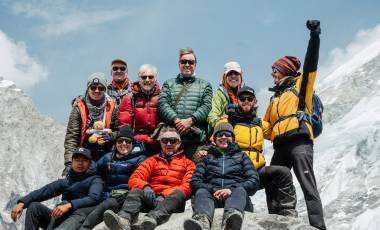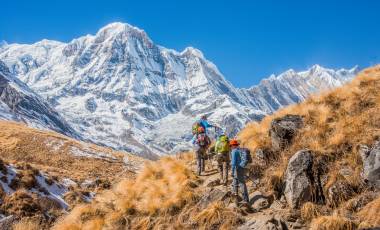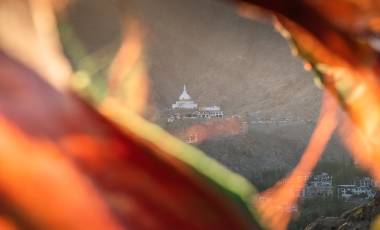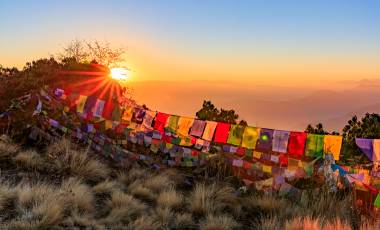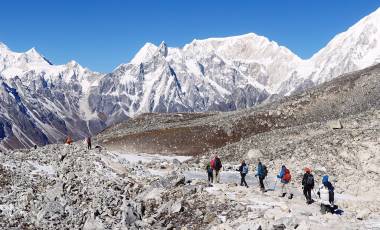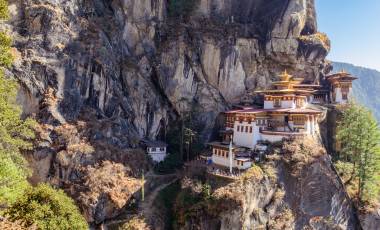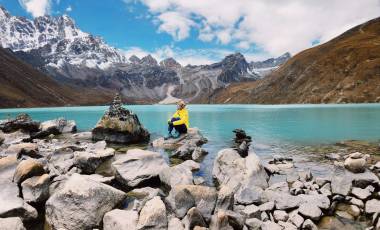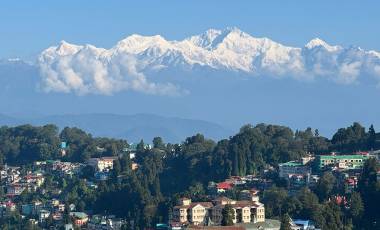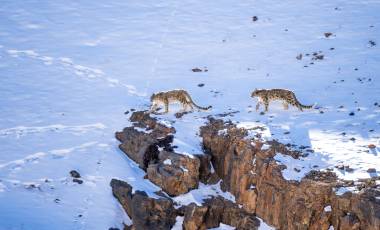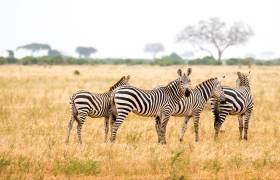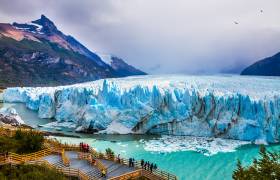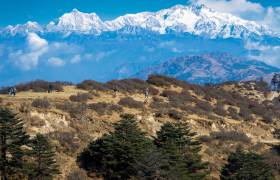Wonderful landscapes and trekking over the high passes gives a real sense of the geography of the place.

Trek the Himalaya
Our Best Himalaya Tours
Top 5 Himalaya Treks
1.Everest Base Camp Trek
It’s a legendary destination for a reason! Embark on the epic Mt. Everest Base Camp hike with our expertly guided small group trekking tour, starting in Kathmandu. Traverse picturesque Sherpa villages and lush forests as you ascend towards the majestic Himalayan peaks. Highlights include Namche Bazaar, Thyangboche Monastery, and the unforgettable experience of reaching Everest Base Camp.
2.Everest & Gokyo Lakes Circuit
From the bustling streets of Kathmandu to the serene mountain trails of the Himalayas, immerse yourself in the beauty of Nepal’s landscapes. Trek through picturesque villages, lush forests, and ancient monasteries as you ascend towards the breathtaking peaks of the Khumbu region. Experience the Sherpa culture, witness panoramic views of Everest, and conquer high mountain passes like Cho La. This once-in-a-lifetime journey culminates with awe-inspiring moments at Everest Base Camp and Kala Pattar, offering unparalleled vistas of the world’s highest peaks.
3.Annapurna Sanctuary Trek
Trek through lush rhododendron forests, quaint villages, and rugged mountain terrain as you make your way to the base of Annapurna. Experience the magic of sunrise at Poon Hill and the breathtaking panorama of Annapurna Base Camp. With comfortable teahouse accommodations and expert local guides, this adventure promises memories to last a lifetime.
4.Manaslu Lodge Circuit
Take a lesser-known trek around one of the highest mountains in the world, the formidable Manaslu. Follow the mighty Buri Gandaki River as it narrows into a spectacular gorge, passing through tiny villages perched on valley sides. Explore alpine meadows inhabited by a cluster of Tibetan communities below the north face of Manaslu before crossing the Larkya Pass. Take in the breathtaking snow-capped peaks of Himalchuli, Manaslu, Cheo Himal and Himlung Himal, before descending through forest to join the main Annapurna Circuit route.
5.Langtang & Gosainkund Lakes
The stunning Langtang Valley lies to the north of Kathmandu and sees fewer trekkers than the Annapurna or Everest regions. In the fall, it is blessed with superb views of the mighty Langtang Lirung, while in spring it comes alive with birds and flowers. This trek takes you to glaciers, summits, and the spectacular holy lake at Gosainkund, an important place of pilgrimage.
Helen Casson Peaks of Ladakh Trek
James Nesbitt Peaks of Ladakh TrekGreat trip with fantastic guide (Valerie Parkinson)
When is the best time of year for a Himalaya trek?
The best times for Himalaya hiking trips are typically during the spring (March to May) and autumn (September to November) seasons. During these periods, the weather tends to be stable, with clear skies and mild temperatures, creating ideal conditions for trekking.
Snow should be expected at higher altitudes on any departure, and travelers should always be prepared for unpredictable weather conditions in the mountains.
What should I expect on a Himalaya tour?
On a Himalaya small group trek, you can expect an immersive and intimate experience exploring the stunning landscapes and rich cultural heritage of the region. Led by experienced local guides, you’ll trek through breathtaking mountain scenery, passing through remote villages and ancient trails. Along the way, you’ll have opportunities to visit monasteries, temples, and traditional villages, gaining insights into the local way of life. The small group size allows for a personalized experience, forging friendships with fellow travelers as you share in the adventure together.
FAQs on Himalaya Treks
Exodus prides itself on its extensive experience in organizing Nepal tours for over three decades. The local guides leading these treks are carefully selected based on their deep knowledge of the trails and the region, ensuring a safe and enjoyable experience for trekkers. These guides undergo rigorous training, not only in first aid but also in recognizing and managing symptoms of altitude sickness, a crucial aspect of trekking in high-altitude environments.
Their expertise extends beyond just navigating the terrain; they also possess a profound understanding of local customs, weather patterns, and the rich cultural and historical context of the Himalayan region. This wealth of knowledge enhances the overall trekking experience, allowing participants to fully immerse themselves in the adventure while feeling confident in their guides’ abilities.
Whether it’s tackling challenging mountain passes or sharing fascinating insights into the region’s culture and history, our local guides are dedicated to ensuring that trekkers have an unforgettable and enriching journey through the Himalayas.
During your Himalaya trek with Exodus, you can expect to stay in basic tea houses or lodges along the trekking routes. These accommodations typically feature shared sleeping quarters and communal dining areas. While amenities may vary from place to place, they generally offer a comfortable place to rest after a day of trekking.
One of the highlights of staying in these tea houses or lodges is the opportunity to enjoy stunning mountain views and immerse yourself in the local culture. It’s a chance to experience authentic Nepalese hospitality and connect with fellow trekkers and locals along the way.
For more specific details about the accommodations on your particular tour and departure, be sure to check your trip notes.
We offer a variety of treks in the Himalayas. Check the activity rating of the tour prior to booking and review your trip notes for details on trekking distances and altitude gains and use this as a reference on how to prepare. A good level of fitness is recommended for trekking in Nepal, as many of our tours in this region involve long days of walking and altitude gains. Trekkers should be prepared for physical exertion and be able to walk for several hours each day. For more details on how to prepare, check your trip notes and our fitness guide.
When preparing for a Himalaya trekking tour, it’s important to be mindful of local customs and dress respectfully. Nepalis often adhere to traditional dress norms, so trekkers are advised to dress conservatively. This means avoiding sleeveless tops or revealing clothing that may be considered inappropriate in more traditional communities.
While shorts are generally acceptable for both men and women, they should be modest and reach just above the knee. For women, a skirt or trousers may be preferable, especially in areas where traditional attire is more common.
Since Nepal’s mountainous terrain can experience a wide range of temperatures and weather conditions, it’s crucial to dress in layers. Layering up with multiple thin layers allows for better temperature regulation throughout the day and provides insulation against the cold. Additionally, it’s essential to pack clothing that is moisture-wicking and quick-drying, as you may encounter varying weather conditions during your trek. Check your trip notes for more detailed packing information.
On the treks where altitude is a factor, altitude sickness prevention measures include acclimatization days built into the itinerary, gradual altitude gains, and experienced guides trained to recognize and manage symptoms of altitude sickness. Additionally, trekkers are advised to stay hydrated, ascend slowly, and listen to their bodies.
Expert Blog Entries
The Adventure Begins Here
Get regular inspiration straight to your inbox from Exodus’ experts.

